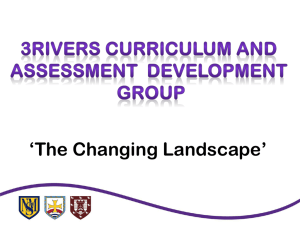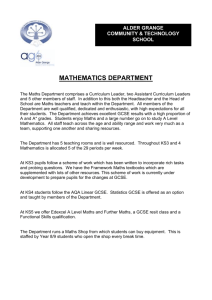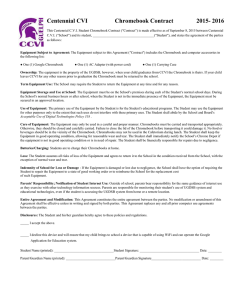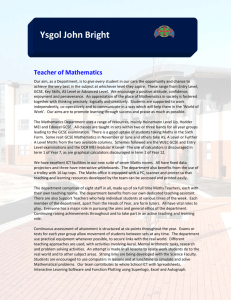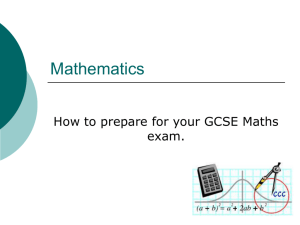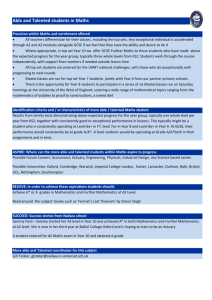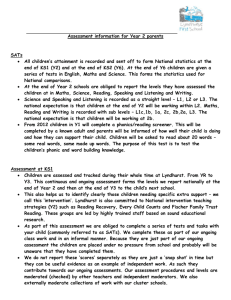Reading Eggspress - Carr Hill High School & Sixth Form Centre
advertisement
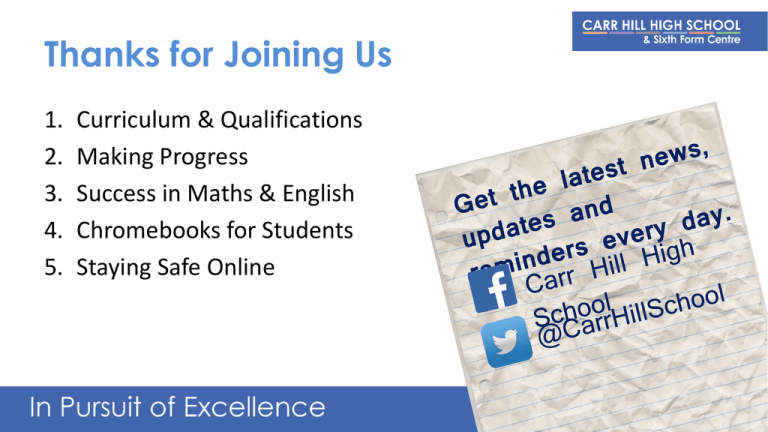
Thanks for Joining Us 1. 2. 3. 4. 5. Curriculum & Qualifications Making Progress Success in Maths & English Chromebooks for Students Staying Safe Online New GCSE grades • Graded from 9-1, replacing A*-G grades • Grade 9 will be highest • Grade 5 will be considered a good pass, equivalent to a current low B or high C. It will be linked to standards in high performing countries • Grade 4 will be equivalent to current low C grade • Grade 1 will be lowest • Introduced for new-style GCSEs in English and maths to be taught from September 2015 • First of new exam grades awarded summer 2017 • GCSEs that your children take will all be graded under the new system Above Average School KS2 KS3 KS4 GCSE Target KS2 Level KS2 Fine Level (Reading & Maths) Year 7 Target Year 8 Target Year 9 Target Year 10 Target Year 11 Target New GCSE Target Grade Old GCSE Target Grade 6/5 >= 5.8 4 6 7 8 9 9 A*/A*+ 5 5.4 - 5.7 3 5 6 7 8 8 A+/A*- 5/4 4.9 - 5.3 3 4 5 6 7 7 A-/A 4 4.5 - 4.8 2 3 4 5 6 6 B/B+ 4/3 4.0 - 4.4 1 2 3 4 5 5 B-/C+ 3 3.3 - 3.9 W3 1 2 3 4 4 C-/C 3/2 2.0 - 3.2 W2 W3 1 2 3 3 D 1 <= 1.5 W2 W3 1 1 2 2 E 1 <= 1.5 W1 W2 W3 1 1 1 F 1 <= 1.5 W1 W2 W3 1 1 1 G Keeping track of progress • Flight paths • Tracks progress against targets • Find it on the first page of exercise books Reports • • • • • • 1-9 grade and A-C confidence level reported in all subjects Confidence level A – very confident of grade Confidence level B – confident of grade Confidence level C – not as confident of grade Available on Moodle. Paper copies can be requested from the data manager December, February, April and July Mathematics Why PTMs? • KS2 SATs results give us a guide to which Maths set your children should go into when starting year 7 at Carr Hill. • What we don’t know is which topics and processes your children are good at. • PTMs allow us to see which mathematical topics and processes your children will need support with during their first year at Carr Hill. • This informs your children’s Maths teachers in planning appropriately to support the Mathematical needs of your children in order for them to make good progress at Carr Hill. What does the report tell us? Needs some support on number, ratio and proportion Very good at statistics Needs to focus on algebra, measurement and geometry. What does the report tell us? Very good at recalling facts. Has a fairly good understanding of where these facts come from. Will need support with the application of these facts within a mathematical problem. They may need particular support with how to justify an answer, not just stating a method used. How can you help support your children with Mathematics? • The report give details in the section. • After each assessment your children will be given a question by question analysis of their results. Encourage them to complete work on their target areas. • Encourage your children to use the support made available to them. GCSE Mathematics Analysis and Support Students will receive this form after each assessment. They will be expected to complete their targets. You can help your child by encouraging them to complete these. Support Available • • • • • • • • • 8 hours of Maths teaching per fornight) Comprehensive differentiated scheme of work In depth assessment and feedback Revision guides available MathsWatch Kerboodle MyMaths Drop in sessions – Tuesday and Thursday lunch times Targeted intervention and revision sessions Should you need any further information, please contact either: • Bernadette Taylor - Director of Learning btaylor@carrhill.lancs.sch.uk • Laura Potts – Assistant Director of Learning lpotts@carrhill.lancs.sch.uk James Myers – Assistant Director of Learning jmyers@carrhill.lancs.sch.uk • • English PTE Tests • In the first week of term, year 7 students completed tests in English. The tests focus on spelling, punctuation and grammar skills as well as assessing reading comprehension. • The test programme is diagnostic and enables teachers to gain further knowledge about students’ strengths and weaknesses in these skill areas. • Results from the tests enable us to differentiate work and provide targeted interventions to improve pupil progress. • PTE tests do not focus on extended writing skills. When we return after half term, pupils will sit their writing assessments • Interventions include one to one or work within small groups. These will usually be within their normal English lessons and they include both in-class support and withdrawal from lessons on a short term basis. • Short term interventions have already started for many pupils. This will be extended after half term but please remember, not all pupils will need this. • If other arrangements for more sustained intervention are needed, you will always be informed and regularly updated. Reading Eggspress • Reading Eggspress is an on-line programme designed to build reading and comprehension skills. Using an engaging format, children are instantly involved and interested. The range of activities motivates students to return regularly to read books, complete comprehension quizzes, earn rewards and improve their comprehension and spelling skills. • Reading Eggspress has a reporting system which enables teachers, students and their parents to see achievements. Reading Eggspress • The site’s Library has more than 1000 fantastic fiction and factual e-books, including illustrated chapter books, full colour non-fiction books and a range of classics. • Reading materials need to match children’s reading ability and all Reading Eggspress e-books are levelled by reading age so children can easily find books of interest at their reading level. Reading Eggspress • In the Autumn term, students in year 7 are able to access Reading Eggspress. Login details have been provided by English teachers. • Students can access Reading Eggspress via the internet at home or at the School’s Learning Hub. • Please contact your child’s English teacher or Ms Fry if you have any questions about Reading Eggspress. Reading Challenge • In English, we have created the Carr Hill Reading Challenge! Students are challenged to read a range of fiction and nonfiction texts. Then, they record and review their ideas about these texts in their booklets. • As students read more widely, they receive certificates to celebrate their successes. Parents and Carers • • • • • All parents/guardians will be provided with a report on their child’s PTE results. These will also include clear guidance on how you can help your child with their very specific needs. You can help to support your child to read widely by encouraging them to access Reading Eggspress and recording what they read in their Reading Challenge booklets. Such tasks promote reading, comprehension and independent learning. Thank you for encouraging your child to complete such tasks regularly as ongoing homework. Finally, please note that PTE tests do not focus on extended writing skills. When we return after half term, pupils will sit their writing assessments and parents will be updated. “It is important for us to embrace the use of technology to maintain an innovative approach to teaching and learning which fully prepares students for further education and employment in a technological world” What we’ve done to prepare • Extensive research on technology to support learning • 2014 device trials • Chromebook Pilot in 2014 with Y8 and within Logic Cluster • Student, Staff and Parent/Carer surveys and consultation groups • Considered projects in other schools What is a Chromebook? • • • • Laptop-style device Google operating system Secure, safe & simple to use Long life-span Our Chromebook Trial • Duration: Four months • 38 students and their teachers in Y8 • Students across all year groups in our logic cluster • Ongoing research and analysis Our Chromebook Trial Average Student Progress in all trial subjects Chromebook trial class -0.2 0 0.2 0.4 0.6 0.8 1 1.2 1.4 100% of parents/carers told us: • • • • • “My child had benefitted from the use of a chromebook” “My child had made good use the device in school” “My experience in the pilot had been positive” “The school should use IT technology to support learning” “The school should develop a project which will allow students to use a personal chromebook (or similar) device in school” Our Scheme • All Y7 and Y9 students involved • Small initial deposit • Project designed to guarantee small monthly contributions (or one-off payment) • Financial assistance for students supported by the Pupil Premium • Launch Spring 2016 • Device ultimately belongs to family • Protected by full warrantee and insurance Prefer to bring you own device? • Our scheme is flexible to support a range of devices with an integrated keyboard • Equal access to school resources for every student What happens next? Set-up regular online payment Enrol in scheme Make deposit payment online Launch Meetings Spring 2015 Launch Devices issued Planning Ahead Dates Wed 21 Oct 2015 Mon 9 Nov 2015 What’s happening Please return Enrolment form to school Please make your deposit payment online We’ll then send you some information about setting up your regular payments/one-off payment December 2015 January 2016 Devices issued to students Devices used across the school in Y7 and Y9 Staying Safe Online Welcome! A key skill for life Wide and flexible range of information Accessed anywhere anytime Easy to communicate with friends and family Motivational and fun Raise standards Why do we and our young people use ICT? Aims of this session • Look at how children are using the Internet • Raise awareness of eSafety issues • Offer guidance on keeping your child safe Why is it important? 62% of children use a tablet at home. Among these children aged 5 – 15, 34% now have their own device. Girls use devices for social activities 11% of children aged 3-4 now have their own device which means they are much more technologically advanced when they arrive at school. In a typical weeks girls aged 12 – 15 send on average 163 texts versus 113 from boys. How we use these technologies Parents / Carers e-mail Shopping Booking holidays Research Young people Music Games Chat Instant Messaging IM Blogs Social Networking Are you one of the 28% of parents who use the internet and describe yourself as a beginner? 7% of children describe themselves as beginners Some of the technologies…… Mobile phones Instant messaging Social networking BLOGS What next ??? E-mail Gaming sites Music Download sites Podcasting Chat Rooms Video broadcasting Text What are the dangers for our children? – 26% of parents can’t check website history – 65% of young people can clear internet history – 65% of parents can deny access to specific websites – 46% of children can get round parental blocks – 33% of children have met a ‘friend’ online – 8% have had a face-to-face meeting with an online friend – 89% told someone they were doing so UK Children Go Online, 2005, 9-19 year olds • Usage and experiences are not reported to parents/teachers as they interfere with access Practical Advice for Parents/ Carers and Students Home and Family Guidelines ☺ Practical principles Talk with, NOT at your children. Agree family guidelines and rules. Discuss regularly online safety. ☺ Infrastructure Virus and firewall software up to-date, Browser ‘safe search’ enabled. ☺ Education Learn together about new technologies and enjoy! Reflect together about new technologies, the benefits, dangers and potential. ☺ Systems Keep webcams in family rooms Monitor time spent on the internet View the ‘History’ or purchase filtering software. Have proportionate responses to problems. Your child will not tell you about a problem if they feel their access to the technologies will be restricted. Conversation Starters . . . . • Ask your children to tell you about the sites they like to visit and what they enjoy doing online. • Ask them about how they stay safe online. What tips do they have for you, and where did they learn them? What is OK and not OK to share? • Ask them if they know where to go for help, where to find the safety advice, privacy settings and how to report or block on the services they use. • Encourage them to help. Perhaps they can show you how to do something better online or they might have a friend who would benefit from their help and support. • Think about how you use the internet as a family. What could you do to get more out of the internet together and further enjoy your lives online? eSafety useful links • • • • • • http://www.parentscentre.gov.uk/ www.thinkuknow.com http://www.getnetwise.org/ http://www.childnet-int.org/ http://www.bbc.co.uk/webwise/ http://www.iwf.org.uk/ www.nspcc.org.uk Internet slang: are you down with it? PAW GNOC LOL ASL BCNUL8R NOOB 133+ TTYL NP LMFR BRB FOAF POS GF Internet slang: are you down with it? • • • • • • • • • • • • • • LOL – Laugh out loud 133+ - Elite BRB – be right back NOOB – new person in the room/game TTYL – talk to you later LMFR – let’s meet for real GNOC – get naked on camera ASL – age sex location FOAF – friend of a friend POS – parent over shoulder GF – Girlfriend PAW – Parents are watching BCNUL8R – Be Seeing You Later NP – Nosy Parents

